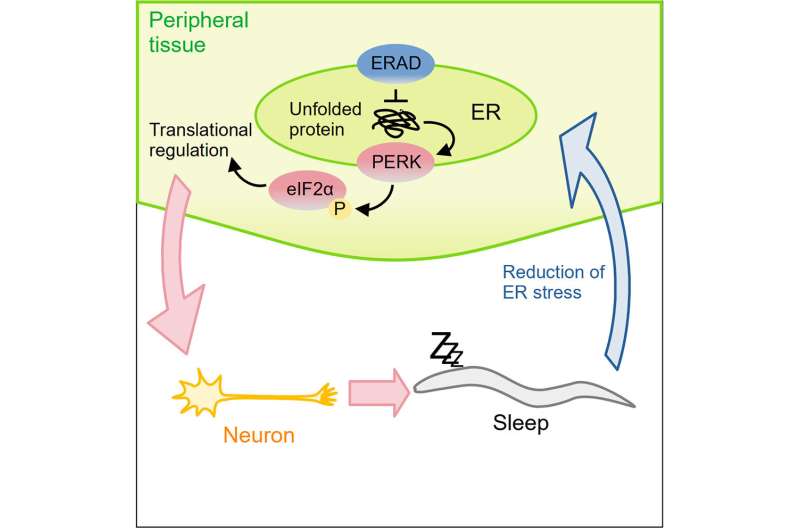This article has been reviewed according to Science X's editorial process and policies. Editors have highlighted the following attributes while ensuring the content's credibility:
fact-checked
peer-reviewed publication
trusted source
proofread
Worm genetics reveal important pathways for sleep regulation

Although the regulation of sleep—how much, when, and how sleep occurs—is mainly considered to be controlled by the brain, sleep deprivation also affects the body, and signals from the body can affect sleep. However, the ways in which the body regulates sleep are largely unknown. In a recent study published in Cell Reports, Japanese researchers have revealed that sleep in worms is regulated by the body via cellular pathways that maintain proper protein function, from synthesis to degradation.
When exploring the body's regulation of sleep, it can be difficult to know where to start. The researchers from the University of Tsukuba chose to use an unbiased investigative technique known as forward genetic screening. To do this, they first applied a chemical to cause random mutations in about 500 worms, and then used a video-based monitoring system to identify the worms that slept much more or less than average. When they identified such worms, they looked at what mutations they had, how the mutations affected the sleep.
"Using this method, we were able to identify that mutations in the sel-1 and sel-11 genes were associated with longer sleep duration," says senior author of the study Professor Yu Hayashi. "Both genes code for proteins that are part of the endoplasmic-reticulum-associated protein degradation pathway, which helps cells to get rid of proteins that are misfolded."
The researchers also found that mutations in mars-1, which is important for protein synthesis, were associated with prolonged sleep in the worms. Moreover, although sel-1, sel-11, and mars-1 were expressed in a wide range of tissues, when the researchers made the worms express normal versions of some of these genes in skin cells led to normal sleep patterns. These results indicated that protein-regulating pathways in the body are indeed important for controlling sleep.

"We were also able to identify some downstream pathways that are involved in sleep regulation by modifying the expression of proteins in the worms," says Professor Hayashi. "Furthermore, when we tested our results from worms in mice, we found that these pathways also seem to regulate sleep in mammals."
Sleep disturbances are widely considered to influence inflammation and immunity, and may contribute to diseases such as inflammatory bowel disease and arthritis. A better understanding of how sleep is regulated is thus key to disease prevention. The results of this study add to a growing body of literature on sleep regulation and are hoped to improve sleep disturbance therapies in the near future that may prevent inflammatory diseases such as arthritis.
More information: Taizo Kawano et al, ER proteostasis regulators cell-non-autonomously control sleep, Cell Reports (2023). DOI: 10.1016/j.celrep.2023.112267
Journal information: Cell Reports
Provided by University of Tsukuba


















